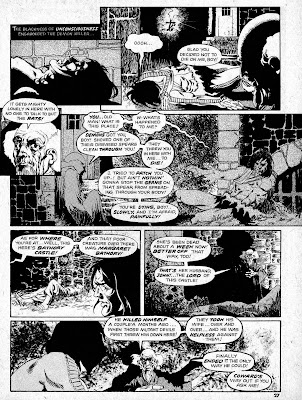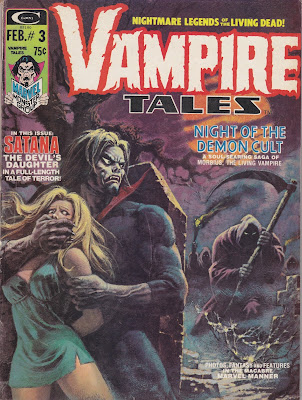Book Review: 'Haggopian and Other Stories' by Brian Lumley
2 / 5 Stars
At 606 pp., ‘Haggopian and Other Stories’ is a thick
doorstop of a mass-market paperback, released in November of 2009 from UK
publisher Solaris. The cover artist is Bob Eggleton.
Of the 24 stories in this short story compilation, all but two
were first published during the interval from 1969 – 1989, mostly in editions from Arkham
House or other specialty publishers.
Some of the stories (‘Cement Surroundings’) eventually were worked into the form of chapters in Lumley’s ‘Titus Crow’ novels, such as ‘The
Burrowers Beneath’.
In his Introduction, and in the prefaces that accompany each
story, author Lumley credits August Derleth with supporting his efforts at
becoming a published writer. As well, Lumley defends Derleth from what the
former feels are unjustifiable criticisms of Derleth’s handling of some
elements of the Mythos, such as the imposition of a good/evil duality on the actions of the various Deities.
Rather than provide mini-reviews of each tale, which would
be laborious, I will categorize the contents, and this, hopefully, should
provide sufficient detail to allow readers to render a judgment on whether ‘Haggopian’
is the type of book they’re looking for.
The majority of the stories are ‘traditional’ Arkham House-style
Mythos entries: in other words, they follow the paradigm in which Seekers of
Eldritch Knowledge meddle with Forbidden Things, and wind up in direst
difficulties. Such stories rely on atmosphere and setting, rather than
employing graphic descriptions of horror, to unsettle the reader.
‘Cement
Surroundings’, ‘The Night Sea-Maid Went Down’, ‘Recognition’, ‘Aunt Hester’,
‘The Kiss of Bugg-Shash’, ‘The Sister City’, ‘The Statement of Henry Worthy’,
‘Dagon’s Bell’, ‘The Mirror of Nitocris’, ‘The Second Wisk’, and ‘The Hymn’ all
are competently-written stories, if not particularly original or imaginative in
scope.
Titus Crow himself makes appearances in ‘The Caller of the
Black’, ‘Name and Number’, ‘De Marigney’s Clock’, and ‘The Black Recalled’, often
to provide succor to fumbling amateurs caught up in dangerous occult phenomena.
Other tales are set in the ancient days of Lumley’s ‘Primal
Lands’ series, and / or the Dreamlands of Lovecraft’s ‘Randolph Carter’
character: ‘Mylakhrion the Immortal’, ‘Dylath-Leen’, and ‘The Sorcerer’s
Dream’.
The ‘Curse of the Golden Guardians’ feature’s Lumley’s Conan-
modeled barbarian hero, Tara Khash. It’s one of the better entries in the
anthology.
The best entries are those in which Lumley infuses his
traditionalist tack with a greater helping of gruesomeness and gore.
‘Haggopian’, about a deep-sea explorer with an abnormal fondness for parasitic
aquatic life, is genuinely creepy. ‘What Dark God’ features a nasty act of
vampirism, and ‘The Thing from Blasted Heath’ introduces the carnivorous plant
trope with greater effectiveness than the entirety of Scott Smith’s novel, ‘The
Ruins’. ‘The House of Cthulhu’ echoes Lovecraft’s ‘Dagon’, and features the
infliction of a loathsome fate upon those foolish enough to trespass on
blasphemed ground.
‘Synchronicity or Something’ is a half-humorous look at the
fanboy world associated with the Chaosium role-playing games.
The verdict ? Dedicated fans of Lumley and / or the Mythos
will probably want to have this anthology on their shelves. However, I suspect that readers looking for entertaining horror fiction per se will find the packaging of 600+ pages with 24 stories, all with similar themes, too unvaried a diet to be truly engaging.






















































































